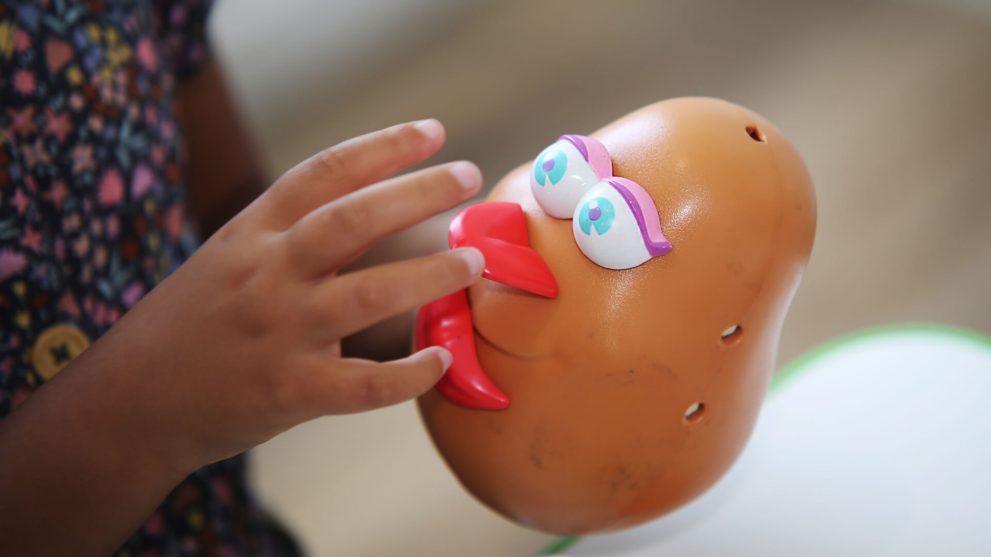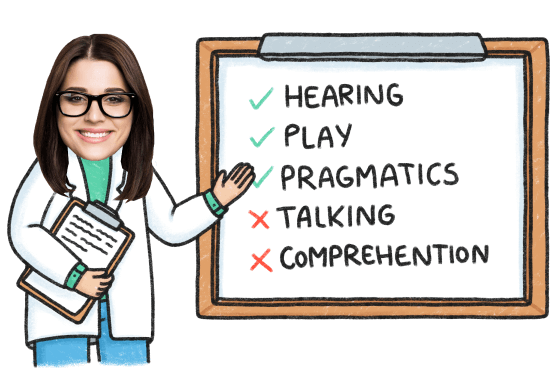How to Do Speech Therapy at Home
Feb 9, 2022 Whether your child is waiting to get services or attending regular speech therapy appointments, speech therapy at home is an essential part of a child’s verbal communication success. The more you integrate speech therapy techniques at home, the more your child’s language development will thrive.
In This Article
Tips for Success
It is overwhelming at first to start speech therapy for toddlers at home. However, you don’t have to be a speech therapist to start including small tasks and activities to further language development. Start with the following tips for at-home speech therapy success!
Boost Your Child’s Speech Development!
Improve language & communication skills with fun learning!

Start by Focusing on Your Child’s Speech Weaknesses
If your child struggles with pronouncing certain sounds, then start by emphasizing and learning how to say words with the corresponding sound. For instance, if ‘f’ sounds are not articulated properly, start adding in words with ‘f’ sounds in everyday conversations. Add words like fish or roof into sentences. Include speech activities like simple flashcards with sight words and pictures with ‘f’ sounding words.
This strategy can be applied to other word sounds your child struggles with. To cause less confusion for your child when learning different sounds, tackle one speech articulation sound at a time. This will help your child to achieve and master each small part of speech he or she struggles with and will also increase their confidence with language development.
Recommended article
Set Reasonable Goals
Goal-setting is essential for the success of speech therapy at home. Without goals, you and your child have nothing to work toward and little to no direction for at-home speech therapy activities. But you have to be cautious of setting unreachable goals for your child. The point of goal-setting is to set small obtainable goals he or she is capable of achieving.
The best way to set goals is to first start by identifying your child’s speech weaknesses and set a goal with corresponding activities and everyday speech “weaknesses” in conversations. If your child struggles with “f” sounds start conversations and read books about fish. For goal-setting, you can always add in a time frame of completing goals as well. Once a goal is completed, build upon the same goal or move on to another speech “weakness” your child struggles with.

Listen
This is one of the simplest things you can do for speech therapy for toddlers at home! Sometimes as parents we try and fill in the gaps in our child’s speech. You may ask a question, and help your child answer the same question. Instead, after you ask a question, give a large pause in the conversation to allow your child the opportunity to answer (even if he or she doesn’t). These pauses in conversation will help your child understand the words and opinions they have meaning and matter to you!
At-Home Speech Therapy Activities
Paint with Straws
Blowing through a straw is a great way to strengthen your child’s facial muscles. This will help develop the small muscles in the face to aid in the formation of new words. Of course, just blowing through a straw is boring, so try painting with straws!
Place drops of watercolor or acrylic paint on a piece of paper and have your child move the paint with his or her breath around the paper by blowing through a straw. The only rule is that your child can’t use the straw to push the paint around. They can only use their breath to move the paint.
Craft Sticks for Word and Picture Recognition
You can use large craft sticks to write words and even place small corresponding pictures for practicing speech sound and word recognition. These craft sticks can then be used as “flashcards” or take out one craft stick and have your child color a picture, read a book, or match small pictures that rhyme with the word or represent the word itself.
Mr. Potato Head

Mr. Potato Head is not only an all-in-one fun toy for kids, but it can serve as one of your at-home speech therapy activities to use. Mr. Potato Head comes with many accessories that can help your child learn new words associated with body parts (face, nose, arm, etc), plus extra items like hats and glasses. Use a Mr. Potato Head to familiarize your child with learning these new words and have him/her say the body parts out loud as they are placed on the body.
Read Poetry
Any reading is great for speech and language development, but poetry is perfect for toddlers who are just developing speech. Poetry is short sentences and paragraphs that rhyme. This teaches your child how to say new words and learn word associations by rhyming words. Some of the best books kid-friendly poetry books for children are Dr. Suess books!
Speech therapy for toddlers at home can be done successfully. While you don’t need to be a speech therapist, it is always best to work with a qualified speech-language pathologist for the best results possible. Small at-home speech therapy activities like the ones above can easily be included in your child’s daily routine to enhance speech articulation and develop full sentences.
Have a question for our Speech Therapists?


I have a granddaughter age 2 years old who speaks but not as good as she should for her age which I am basing off my experiences with my 3 children. She sometimes sounds like she is speaking a complete different language and also she sometimes says things but then the next day won’t say it anymore. She is constantly saying No or telling us to Go away which I think is because she is getting frustrated. I am constantly saying what something is when she points I told my son in law and daughter to do the same I said if u give when she points then she has no reason to say the word or words. She is extremely smart u show her something once and she repeats it by doing exactly what she was shown she also associates certain sounds with people like a motorcycle or loins car she gets excited saying it’s PopPop because he has an ATV she seen him on it and heard it so she has good memory even with other things not just that but it’s getting her to speak more. Can you recommend anything?
As tough as this can be, you can’t compare children. Even siblings will develop at different rates compared to each other and there are several different factors, such as gender and heredity, that can play a role in speech and motor development. Even though your granddaughter seems to be delayed for her age, there’s no way of truly telling this unless she gets screened and possibly evaluated by a speech-language pathologist.
I totally agree with your suggestion to your daughter that instead of just giving her what she wants when she points, they need to model the correct vocabulary and attempt to have her repeat it. Another way to work on speech is to give her options. For example, if she wants a drink, offer milk and water and have her attempt to say what she wants. If after three attempts, she doesn’t say anything, then move on so that she isn’t frustrated.
Stacie Bennett, M.S. CCC-SLP